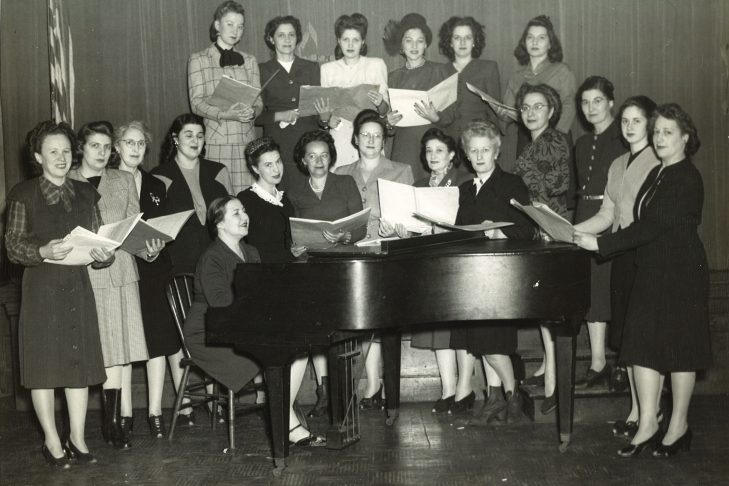On Nov. 16 at the Yiddish Music Shabbat at the Jewish Heritage Center on Newbury Street, we will celebrate the history of Boston’s Jewish music scene by taking a closer look at the stories of musicians in the Center’s archival collections. We’ll serve a kosher-style Shabbat dinner, too. Some of these stories are highlighted here.
Mary Wolfman Epstein was hailed by The Jewish Advocate as “Boston’s Queen of Jewish Music” and “Jewish Music’s First Lady.” Born on Aug. 18, 1908, in the West End of Boston, Mary made her professional singing debut on March 29, 1932, at Jordan Hall at New England Conservatory. During her early career, she worked as a secretary to talent manager Aaron Richmond, but was active at numerous summer resorts in New Hampshire, where she worked as an entertainer, musical director and mistress of ceremonies. From 1952 to 1967, she directed the Brotherhood Glee Club at Kehillath Israel. It was while directing this group, and others, that she wrote more than 30 original musical plays. One of Mary’s most significant contributions was the founding of the New England Jewish Music Forum in 1958. The mission of the Forum was to “promote interest in Jewish Music; elevate and maintain high standards of programming and performance; encourage writing of new works and to present young artists as well as established performers.” The organization closed its doors in 1990.
- Noted violinist Percy Brand’s story was well-known among his contemporaries. Born in Liepaja, Latvia, on April 2, 1908, Percy was concertmaster of the Riga Latvian Symphony Orchestra when the Germans took control of the Baltic states in 1941. Percy credited the violin for saving his life while in Buchenwald. In interviews given in 1949, he described playing for the ghetto’s commandant and being rewarded with food: “Every time they called me to play, I would get a bit of food, probably the only thing that kept me alive.” Percy Brand is the second known musician to have a case file in the Hebrew Immigrant Aid Society, Boston port records.
Piano prodigy Bertica Shulman also required the services of HIAS Boston while seeking a permanent visa to study music at the Longy School of Music. Her file, as well as Percy’s, will be some of the archival documents on display.
Classical pianist Evelyn Borofsky Roskin and her husband, Janot, were two other well-regarded local musicians. Janot was the choir director at the largest synagogue in Berlin before immigrating to Boston in 1937. After his death in 1946, Evelyn served as music director and organist at Temple Sinai in Brookline, and created the popular and ongoing Passover Music Festival while there. These stories, and more, will be presented visually through photographs, musical compositions, scripts and other documents that highlight these remarkable musicians and their legacies. Usually, these materials are stored in boxes behind locked doors, but on Nov. 16, you’ll have the opportunity to view them and “meet” the people whose stories they tell.
We hope to see you there! Find tickets here.
Never miss the best stories and events! Get JewishBoston This Week.
This post has been contributed by a third party. The opinions, facts and any media content are presented solely by the author, and JewishBoston assumes no responsibility for them. Want to add your voice to the conversation? Publish your own post here.
MORE



